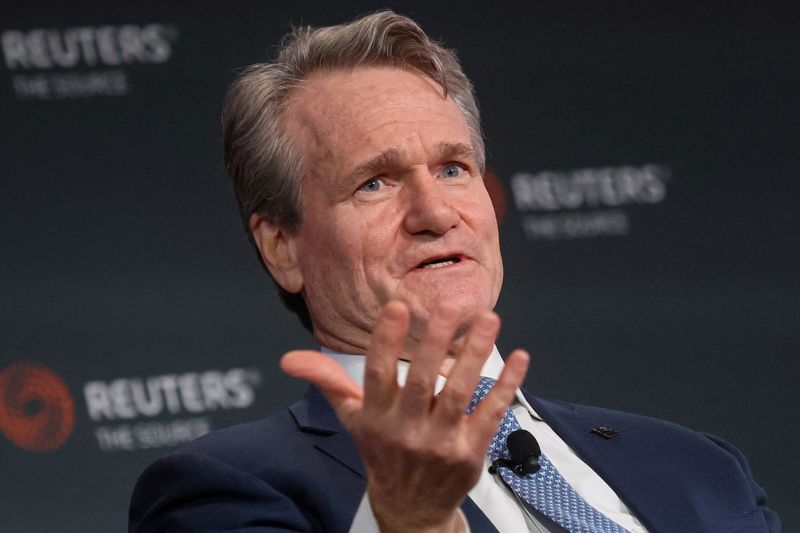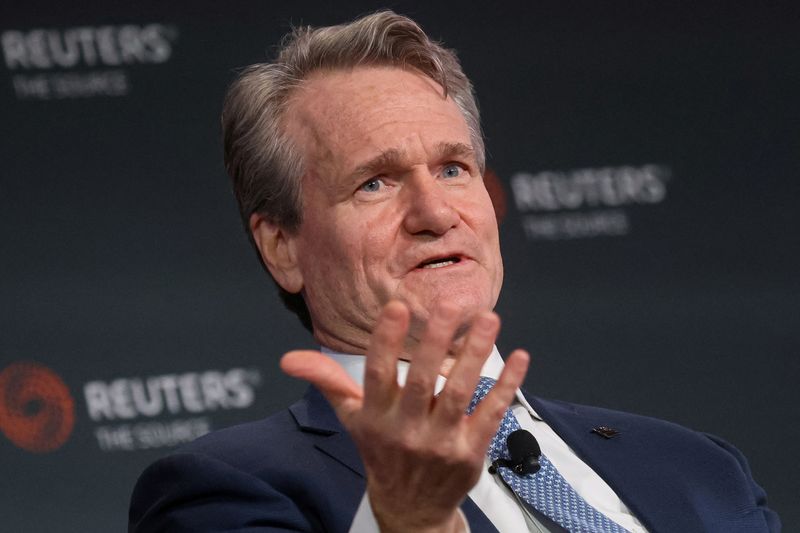Economy
Reuters NEXT-US banking execs on geopolitical risks, soft landing


© Reuters. Bank of America Chairman and CEO Brian Moynihan speaks at the ReutersNEXT Newsmaker event in New York City, New York, U.S., November 8, 2023. REUTERS/Brendan McDermid
(Reuters) -Top U.S. banking executives warned that geopolitical tensions pose a major risk to economic growth, and could upset the poise markets have attained in recent months as more investors have been hoping for a soft landing.
Here are some excerpts from their interviews at the Reuters NEXT conference in New York:
PETER ORSZAG, CEO AT LAZARD * GEOPOLITICS
“It’s an unusual combination of a pretty constructive U.S. macroeconomic environment combined with severe geopolitical risk.” * POSSIBLE U.S. GOVERNMENT SHUTDOWN
“A disagreement over whether funding for Ukraine should continue or not is likely to be (the cause) if the government shuts down.” * POSSIBLE M&A IN BANKING INDUSTRY
“Given the current stance of antitrust regulators, outside of a crisis, it’s still a challenging environment (for consolidation in regional banking industry.)”
BRIAN MOYNIHAN, CEO AT BANK OF AMERICA * SOFT LANDING EXPECTATIONS
“Our research team is the best in the business. They have moved to the soft landing category. They have a slowdown in the economy in the middle of next year.” * RATE HIKE EXPECTATIONS
“You’re seeing a precipitous slowdown in consumer spending… Financial conditions have tightened. Loans are more expensive so people aren’t borrowing as much. Mortgage rates have moved up and the housing market has slowed down.”
“We have one more rate increase, whether that happens or not. And then starting to bring them down in the second half of next year.” * ON INFLATION COMING BACK TO 2% RANGE
“It takes to the end of ’25 to get inflation down to the low twos level.” * ENVIRONMENTAL, SOCIAL AND GOVERNANCE (ESG) ISSUES
“On a given day, we are criticized for being a large lender to energy companies. On the same day, we are criticized for being a large renewable lender. So you gotta have it right if everybody doesn’t like you.” * ON SUCCESSION
“We have a succession planning exercise … nothing is left to chance here, when I decide or the board decides that my time is up we will activate that plan.” * ON DEALING WITH POTENTIAL CYBERSECURITY THREATS
“You keep dedicating more resources. You cooperate heavily among the industry and with the government.”
“The real value is, over the last 10 years, the administration cooperation with the private sector has been much increased. That’s helpful because the information can flow faster and we can defend ourselves better.”
HOLLY O’NEILL, PRESIDENT, RETAIL BANKING AT BANK OF AMERICA * CONSUMER SPENDING
“There’s a lot of uncertainty across the globe, for sure, and I think that weighs on them but when you look at the actual health of the consumer, it is very strong.” * CAPITAL RULES
“The biggest risk is the disruption from regulation and the impact that will have on the system and then the downstream impact on the consumer.”
JIM ESPOSITO, CO-HEAD OF GLOBAL BANKING AND MARKETS AT GOLDMAN SACHS * TRADING AND INVESTMENT BANKING
“We’re sitting on what is one of the more interesting trading environments in my career. For the medium term, the dealmaking environment will indeed be a little bit less robust.” * BOND MARKETS
“There is a little bit of a supply-demand imbalance in government bond markets.”
SOLITA MARCELLI, CHIEF INVESTMENT OFFICER AMERICAS FOR UBS GLOBAL WEALTH MANAGEMENT * INVESTMENT TRENDS
“Clients are slowly moving out of cash” into fixed income, “we really caution them to not go that much longer out on the curve because the longer end is more susceptible to technical factors like supply.”
SINEAD COLTON GRANT, BNY MELLON HEAD OF INVESTOR SOLUTIONS AND INCOMING CHIEF INVESTMENT OFFICER * GEOPOLITICAL TENSIONS
“With geopolitical tensions elevated in the world, I think it’s very important that we don’t conflate the very muted response that we’ve seen, say over the last four to five weeks, with markets being very sanguine, because they’re not.
“They’re watching the evolution very, very closely and there’s an assumption that all these events remain fairly contained. Should that turn out not to be the case, you will see markets react quite sharply, and that would reverberate beyond the equity markets.”
To view the live broadcast of the World Stage go to the Reuters NEXT news page: https://www.reuters.com/world/reuters-next/
Economy
Russian central bank says it needs months to make sure CPI falling before rate cuts -RBC


© Reuters. Russian Central Bank Governor Elvira Nabiullina attends a news conference in Moscow, Russia June 14, 2019. REUTERS/Shamil Zhumatov/File Photo
MOSCOW (Reuters) – Russia’s central bank will need two to three months to make sure that inflation is steadily declining before taking any decision on interest rate cuts, the bank’s governor Elvira Nabiullina told RBC media on Sunday.
The central bank raised its key interest rate by 100 basis points to 16% earlier in December, hiking for the fifth consecutive meeting in response to stubborn inflation, and suggested that its tightening cycle was nearly over.
Nabiullina said it was not yet clear when exactly the regulator would start cutting rates, however.
“We really need to make sure that inflation is steadily decreasing, that these are not one-off factors that can affect the rate of price growth in a particular month,” she said.
Nabiullina said the bank was taking into account a wide range of indicators but primarily those that “characterize the stability of inflation”.
“This will take two or three months or more – it depends on how much the wide range of indicators that characterize sustainable inflation declines,” she said.
The bank will next convene to set its benchmark rate on Feb. 16.
The governor also said the bank should have started monetary policy tightening earlier than in July, when it embarked on the rate-hiking cycle.
Economy
China identifies second set of projects in $140 billion spending plan


© Reuters. FILE PHOTO: Workers walk past an under-construction area with completed office towers in the background, in Shenzhen’s Qianhai new district, Guangdong province, China August 25, 2023. REUTERS/David Kirton/File Photo
SHANGHAI (Reuters) – China’s top planning body said on Saturday it had identified a second batch of public investment projects, including flood control and disaster relief programmes, under a bond issuance and investment plan announced in October to boost the economy.
With the latest tranche, China has now earmarked more than 800 billion yuan of its 1 trillion yuan ($140 billion) in additional government bond issuance in the fourth quarter, as it focuses on fiscal steps to shore up the flagging economy.
The National Development and Reform Commission (NDRC) said in a statement on Saturday it had identified 9,600 projects with planned investment of more than 560 billion yuan.
China’s economy, the world’s second largest, is struggling to regain its footing post-COVID-19 as policymakers grapple with tepid consumer demand, weak exports, falling foreign investment and a deepening real estate crisis.
The 1 trillion yuan in additional bond issuance will widen China’s 2023 budget deficit ratio to around 3.8 percent from 3 percent, the state-run Xinhua news agency has said.
“Construction of the projects will improve China’s flood control system, emergency response mechanism and disaster relief capabilities, and better protect people’s lives and property, so it is very significant,” the NDRC said.
The agency said it will coordinate with other government bodies to make sure that funds are allocated speedily for investment and that high standards of quality are maintained in project construction.
($1 = 7.1315 renminbi)
Economy
Russian central bank says it needs months to make sure CPI falling before rate cuts -RBC


© Reuters. Russian Central Bank Governor Elvira Nabiullina attends a news conference in Moscow, Russia June 14, 2019. REUTERS/Shamil Zhumatov/File Photo
MOSCOW (Reuters) – Russia’s central bank will need two to three months to make sure that inflation is steadily declining before taking any decision on interest rate cuts, the bank’s governor Elvira Nabiullina told RBC media on Sunday.
The central bank raised its key interest rate by 100 basis points to 16% earlier in December, hiking for the fifth consecutive meeting in response to stubborn inflation, and suggested that its tightening cycle was nearly over.
Nabiullina said it was not yet clear when exactly the regulator would start cutting rates, however.
“We really need to make sure that inflation is steadily decreasing, that these are not one-off factors that can affect the rate of price growth in a particular month,” she said.
Nabiullina said the bank was taking into account a wide range of indicators but primarily those that “characterize the stability of inflation”.
“This will take two or three months or more – it depends on how much the wide range of indicators that characterize sustainable inflation declines,” she said.
The bank will next convene to set its benchmark rate on Feb. 16.
The governor also said the bank should have started monetary policy tightening earlier than in July, when it embarked on the rate-hiking cycle.

 Forex2 years ago
Forex2 years agoForex Today: the dollar is gaining strength amid gloomy sentiment at the start of the Fed’s week

 Forex2 years ago
Forex2 years agoHow is the Australian dollar doing today?

 Forex1 year ago
Forex1 year agoUnbiased review of Pocket Option broker

 Forex2 years ago
Forex2 years agoDollar to pound sterling exchange rate today: Pound plummeted to its lowest since 1985

 Cryptocurrency2 years ago
Cryptocurrency2 years agoWhat happened in the crypto market – current events today

 World2 years ago
World2 years agoWhy are modern video games an art form?

 Stock Markets2 years ago
Stock Markets2 years agoMorgan Stanley: bear market rally to continue

 Economy2 years ago
Economy2 years agoCrude oil tankers double in price due to EU anti-Russian sanctions

































